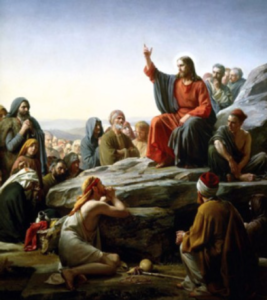From a young age, I always saw the world through a scientific lens. I needed to understand how the world works. When I attended college, that way of thinking applied to research papers and ensuring I had logical and concise arguments to articulate my interpretation of a historical event.
When I read the Gospel of John there is a logical flow to his account of the Gospel events. His entire gospel is masterfully written and laden with tons of symbolism. As a cradle Catholic, I heard John 6 [Jesus’ Bread of Life Discourse] preached frequently during the Mass.
It took years of analyzing this chapter and critically viewing it before I realized the genius and truth contained in Christ’s message. Inevitability my close reading of John 6 led me to this conclusion– the evangelist genuinely believed that Jesus was the literal bread of life that gives humanity eternal life! I give three strong pieces of evidence for this case:
Jesus as a Good Teacher

I think most people would agree with me that Jesus’ followers considered him a good teacher. Jesus could relate to an array of people: rich, poor, fisherman, tax collectors, sinners, and strangers alike.
Secondly, Jesus taught using a plethora of means including sermons, parables, and miracles to name a few. A quality in any good teacher is consistency in content along with the ability to clarify their subject content should disputes arise. In the bread of life discourse in John 6, Jesus presented both his teaching consistently and clearly.
Within a span of 24 verses [John 6:35-59] Jesus mentions point blank at least 6 times he is the bread of life. In verse 35, Jesus states, “I am the bread of life; he who comes to me shall not hunger, and he who believes in me shall never thirst.” Verses 38, 48, 53-58 also support the Nazarene’s intrepid claim.
It’s all Greek to Me
There are a variety of Greek words for the English verb “to eat”. Jesus says in John 6:54, “he who eats my flesh and drinks my blood has eternal life and I will raise him on the last day.” The Greek word that the Evangelist uses in this verse is trōgō. Trōgō translates as “chew” or “gnaw”. Why would John use such a fleshy and literal word for eat in this context? This translation only makes sense if we accept that Jesus literally meant that he is the bread of life. John even goes on to use trōgō in verses 56, 57, and 58– a grand total of four times!
Loss of Followers
The evangelist writes in John 6:66 that many people who followed Jesus from the start of his ministry left him never to return. They were scandalized by the teaching of Jesus as the bread of life. I thought long and hard on this point. Why would many of Jesus’ followers leave him if he only spoke symbolically that he was the bread of life?
Well, if Jesus truly did intend for his claim that he is the “bread of life” to be interpreted figuratively, I doubt many followers would have left him that day. I mean think about it! People tend to become disenchanted with a leader when his or her message becomes too scandalous to bear. I doubt a man speaking figuratively, and poetically, would gather such scandal. Jesus repeatedly claimed, “I am the bread of life”. He never qualified that assertion to be taken figuratively. Such difficult news may have been too much for these fair-weather followers to swallow.
Most Holy Eucharist
According to the Catechism of the Catholic Church, “The Eucharist is “the source and summit of the Christian life” (CCC 1324). It is a non-negotiable belief. Inspired by the Holy Spirit, Saint John knew of the importance of this sacrament and he stressed it frequently in Jesus’ Bread of Life Discourse. Through my Catholic faith, I accept Jesus’ claim that he is the bread of life. I ponder this question of Jesus frequently: Will you also go away? I ultimately hope that my answer is consistent with Peter’s response, “Lord, to whom shall we go? You have the words of eternal life, and we have believed, and have come to know that you are the Holy One of God” (John 6:67-69).
Matthew Chicoine loves the Catholic Church, comics books, and finding truth in literature. He blogs at The Simple Catholic.
